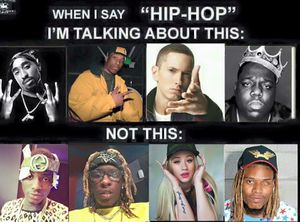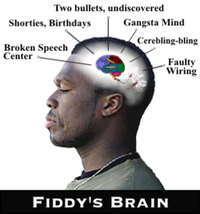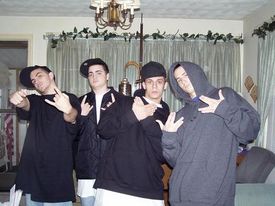Hip-hop music
“I got no snare in my headphones.”
– Eminem on Rap
“EnfenghemwowephfdifjoerBITCHESandMONEYeughtlsapowebjdasipoarpireiojsnapmkjspt”
– Migos on Rap
Hip-hop music, also known as (C)rap music, is a genre of black music centered around the essential concepts of syncopated rhythm, sampling, and themes of urban life. Once the exclusive preserve of the Vienna Concert House, hip-hop is now just beginning to be understood and accepted by the vast majority of wealthy skinny white kids in suburban bedrooms who spend hours pouring over the "beautiful poetry" of rap by candlelight.
Hip hop (stylized as Hip-Hop) is not an elaborate form of music with sophisticated arrangement and meaningful lyrical content. Instead, hip hop is an alleged form of music native to the black tribes of the United States. It stems from the traditional musics of Africa and, in all its unmanliness, poetry. Hip hop music consists of two parts: the beat, an alleged gift from the hip hop deity "FrootyLoops Studio"; and the message, the lyrical part of the song chanted over and over again redundantly and repetitively until it infiltrates the listeners' skull and they accept it as the absolute truth. The contents of the message are almost always disputed, even among the tribes, but one thing is certain: the message is true. Hip hop embraces many musical concepts such as sampling, repeating, and wanting to make love in a club full of other patrons.
History
Roots
The roots of hip-hop can be traced way back to the lovely poetry often rehearsed by 19th century composers, particularly by Gustav Mahler. Gustav invented rap in the 1890s, while he was allegedly "trippin' on shrooms". He overdosed on the medicinal drugs, and fell into a black coma. He was soon transported to another realm of light and magic, of life and death, which was in fact a hospital, where he was put on life support. While recovering in the hospital, Mahler claims he received rap-like revelation from God.
Wrote Mahler in one of his journals:
| “ | It vas musik, but vis a beat - zat vas ze zing.
Up until now, all of ze musiks haf been in some sort of key, but zis new musikal invention off mine is mitout any key. It is "hip" musik, hip musik zat gets your feet hopping. And in conseqvence of zis, I shall call it "hip-hop". |
” |
The new hip-hop music caught on like a storm all across Vienna. A contemporary of Mahler's described it as like being music distilled from the tears of little children and dustbin lids. Even today, a rap tune can bring tears to the eyes.
One of Mahler's early compositions went like this:
| “ | We are islands in the darkness, doomed like aged trees to fall and die in the blazing sun, YO! INNIT NIGGA! | ” |
Unfortunately, after Mahler's untimely demise, rap music sadly fell almost completely into obscurity. The music was outlawed in many countries, and it was only practiced illegally in underground strip clubs. Rap seemed to be fading, but soon it would be revived in a major way.
Revival
A long time later, Snoop Dogg was sent to the same hospital after damaging a paw in a shootout, sending him into a similar coma. As if by osmosis, but in fact, because of a mixture of heavy drugs and lightning, Snoop miraculously recovered. He sprinted back to his crib and dashed off some rap in the back of a limo. Six days and eighty-three glasses of gin and juice later, he finally got a whole tune done. The exact second the music was officially invented, the world's dope freshness rate increased by 348%, as did Mr. Dogg's royalties. This trend continues to grow annually.
After rediscovering hip-hop, Snoop prepared to introduce the genre to the masses by holding a rap battle at The Long Beach Stadium. It was a major success, and word of this funky new music began to spread to many other notable black people such as Tupac Shakur, 50 Cent, Run-D.M.C., Kobe Bryant, and Fred Durst.
The first time a rap show was held was in 1990 at a Violence Prevention Clinic in downtown Los Angeles. Featured rappers included Snoop and Mike Jones. The concert was held for free, once again proving how generous and selfless most rappers are. The concert was an immense success and raised nearly $20 million, which Snoop subsequently donated to a local police precinct. Fans in attendance left the show raving about the new sound, influenced by Snoop, and perhaps the marijuana that the rappers had shot from the amps into the crowd. In any case, the first rap concert helped to further the already fast-growing genre of rap.
Present day
Once introduced to the mainstream, rap music gained much popularity and notoriety. It soon became an important part of modern-day music, especially in Dirty Souff communities, such as the ATL. Today, rap music is produced in an amazingly simple fashion. All one needs to be a rapper is a record studio, and a voice (not always necessary). To be a rapper one also must be a true gangsta, meaning that they've killed at least eleven people in the last month, along with being extremely poor and drug-addicted. Rappers then create a beat, and say the same set of nonsensically rhyming words over and over continuously. A beat can usually be created by recording the sound of someone whistling, clapping, and breathing simultaneously. A common requirement of being a rapper is being black, however certain people have been able to cheat the system.
Being a rapper ranked third in the 2006 edition of Forbes magazine's 16,272 easiest careers. However, contrary to this, it has been well-documented that indeed Pimpin' ain't easy. This issue continues to be debated by many leading scholars.
Rapping
Rapping - not to be confused with raping - is the central part of hip-hop music. It involves speaking rapidly over the mic while trying to rhyme, as opposed to singing while trying to rhyme like in the rest of musical genres. The lack of need to make the voice replicate musical notes has helped people with no actual musical talent, such as Kanye West, to achieve fame as a "musician".
There exists severals types of rap, the most notable being:
- Freestyle – The most common form of rap, this consists of making up words that rhyme as fast as humanly possible.
- Battle – See above, except that two rappers compete in this way.
- Song – A rap "song" actually includes no singing, but has a beat and more rhyming random words.
- Sleep – This form of rap occurs during the REM stage of sleep and is characterized by lyrics relating to falling, flying or trying to run away from the police but not being able to because your feet are heavy and your legs won't exactly work, like they're stuck in grits or something.
- Anger – Anger rap may be heard whilst black people are robbing banks, doing a drive-by, etc. For example: "Give me dat money ASAP, or Im'ma have ta bust a cap."
- Comedy – This form of rap is popular amongst those who are suffering from a debilitating disease and need to loosen up with some floopity oooobity jams.
- SoundCloud – Not actually rap but is frequently confused for it. These so-called rappers mumble unintelligibly into a crappy beat and in some cases, even saturate their voices with autotune in a feeble attempt to "sing" about how many pills and "bitches" they can "do".
- Eminem – Like "song", except the words actually have meaning.
Culture
A rapper's life consists of five basic activities: rappin, pimpin, drinkin, smokin, and the less-known fishin. In fact, a rapper has never been seen when not engaging in one of these activities, even while sleeping. Much like the legend surrounding pirates, rappers are known to bury their bling in obscure locations so nobody can ever find it and take their spinnin rims. To survive rappers have three basic needs: hoards of white women, guns, and drugs/hard liquor. Without any of these necessities, rappers could not live for more than four seconds. Although rappers also are typically known for lots of money, fancy cars, and pimped out cribs, these are not necessities, they simply give the rappers "street cred" in their respective hoods or ghettos.
Influence
Rap music has reached far and wide, influencing many people to change their lives, although usually for the worse. The lifestyle of rappers continues to be widely emulated, especially by affluent white adolescent males.
Many rappers believe that these wannabes are "wiggers" or "posers," and discourage following rappers as role models. A wigger is generally described as "A white person attempting to imitate a black rapper's style." Wiggers are often seen flashing gang symbols in a pathetic attempt to be gangsta. It is easy to tell a wigger from a true gangsta, as a true gangsta will have at least thirty bullet wounds clearly visible on his body; a wigger will typically not have even one single gunshot wound. In fact, some wiggers might not even carry or own a firearm! What lowlife posers.
There have been many positive and negative aspects of rap. Positive aspects include: a new genre of music, and uh...ummm...also....Anyway, negative aspects have been: The increase in crime rates, the over-consumption of drugs and alcohol, and the wiggerization of society. Overall, rap music is likely a sign of the Apocalypse occurring in the near future.
Notable musicians
Hip-hop has become a criminal dominating force in mainstream music, pushing aside beloved genres such as jazz fusion, polka and minimalist ambient opera, relegating them to the well-mannered sidelines of National Public Radio. Today as many as 87% of all musicians self-identify as Rappers, give or take a 4% margin of error due to surprise drive-bys, the LAPD and Whitney Houston.
Below are famous rappers presented in order of most bling to least crunk, or was it most commercial endorsement deals to least number of bullet wounds? Word:
- Eminem
- Jay-Z
- Nas
- Coolio
- 50 Cent
- Snoop Dogg
- Busta Rhymes
- Xzibit
- Lil Jon
- Ol' Dirty Bastard
- Mike Jones
- Kanye West
- Andre Nickatina
- Biggles Smallish
- Wu-Tang Clan
- Run-D.M.C.
- Public Enemy
- Beastie Boys
- Ice-T
- Dr. Dre
- Ice Cube
- Ice Cream
- Vanilla Ice
- Niccolo Machiavelli
- Skee-Unit
- Literally anybody with a sideways hat



